- Home
- Anthony Trollope
Barchester Towers
Barchester Towers Read online
BARCHESTER TOWERS
ANTHONY TROLLOPE was born in London in 1815 and died in 1882. His father was a barrister who went bankrupt and the family was maintained by his mother, Frances, who resourcefully in later life became a bestselling writer. He received little education and his childhood generally seems to have been an unhappy one.
Happily established in a successful career in the Post Office (from which he retired in 1867), Trollope’s first novel was published in 1847. He went on to write over forty novels as well as short stories, and enjoyed, considerable acclaim as a novelist during his lifetime. The idea for The Warden (1855), the first of his novels to achieve success, was conceived while he wandered around Salisbury Cathedral one midsummer evening. It was succeeded by other ‘Barsetshire’ novels employing the same characters including Archdeacon Grantly, the worldly cleric, the immortal Mrs Proudie and the saintly warden, Septimus Harding. These novels are Barchester Towers (1857), Doctor Thorne (1858), Framley Parsonage (1861), The Small House at Allington (1864) and The Last Chronicle of Barset (1867). This series is regarded by many as Trollope’s masterpiece, in which he demonstrates his imaginative grasp of the great preoccupation of eighteenth- and nineteenth-century English novels – property. Almost equally popular were the six brilliant Palliser novels comprising Can You Forgive Her? (1865), Phineas Finn (1869), The Eustace Diamonds (1873), Phineas Redux (1874), The Prime Minister (1876) and The Duke’s Children (1880). The notable titles among his many other novels and books include He Knew He Was Right (1868–9), The Way We Live Now (1874–5), An Autobiography (1875–6) and Dr Worth’s School (1881).
ROBIN GILMOUR was Reader in English at the University of Aberdeen. He was the author of The Idea of the Gentleman in the Victorian Novel (1981), The Novel in the Victorian Age: A Modern Introduction (1986) and The Victorian Age: The Intellectual and Cultural Context of English Literature 1830—1890 (1993). He also edited Trollope’s The Warden for Penguin Classics. He died in 1999.
JOHN KENNETH Galbraith is Paul M. Warburg Professor of Economics, Emeritus, of Harvard University. A noted economic and political writer, his many books include The Affluent Society, The New Industrial State, The Great Crash 1929, A History of Economics, Almost Everyone’s Guide to Economics, The Nature of Mass Poverty, Money: Whence It Came, Where It Went, The Culture of Contentment and Name-Dropping. He is also the author of a book of satirical sketches; two bestselling novels, The Triumph and A Tenured Professor; a study of Indian painting and a volume of memoirs, A Life in Our Times.
ANTHONY TROLLOPE
Barchester Towers
Edited with an Introduction and Notes by ROBIN GILMOUR
Preface by JOHN KENNETH GALBRAITH
PENGUIN BOOKS
PENGUIN BOOKS
Published by the Penguin Group
Penguin Books Ltd, 80 Strand, London WC2R 0RL, England
Penguin Putnam Inc., 375 Hudson Street, New York, New York 10014, USA
Penguin Books Australia Ltd, 250 Camberwell Road, Camberwell, Victoria 3124, Australia
Penguin Books Canada Ltd, 10 Alcorn Avenue, Toronto, Ontario, Canada M4V 3B2
Penguin Books India (P) Ltd, 11 Community Centre, Panchsheel Park, New Delhi – 110017, India
Penguin Books (NZ) Ltd, Cnr Rosedale and Airborne Roads, Albany, Auckland, New Zealand
Penguin Books (South Africa) (Pty) Ltd, 24 Sturdee Avenue, Rosebank 2196, South Africa
Penguin Books Ltd, Registered Offices: 80 Strand, London WC2R ORL, England
www.penguin.com
First published 1857
Published in Penguin Books 1982
Reprinted In the Penguin English Library 1983
Reprinted in Penguin Classics 1987
Reprinted with revised Further Reading 1994
Reprinted with a new Chronology 2003
27
Preface copyright © John Kenneth Galbraith, 1983
Editorial matter copyright © Robin Gilmour, 1983, 1994
All rights reserved
Except in the United States of America, this book is sold subject to the condition that it shall not, by way of trade or otherwise, be lent, re-sold, hired out, or otherwise circulated without the publisher’s prior consent in any form of binding or cover other than that in which it is published and without a similar condition including this condition being imposed on the subsequent purchaser
Contents
PREFACE BY JOHN KENNETH GALBRAITH
ACKNOWLEDGEMENTS
INTRODUCTION
A NOTE ON THE TEXT
A NOTE ON THE CHURCH IN BARCHESTER TOWERS
SUGGESTIONS FOR FURTHER READING
CHRONOLOGY
BARCHESTER TOWERS
NOTES
Preface
Anthony Trollope was born in 1815 with, someone has said, a pen in hand. His father was a financially disastrous barrister, and, in consequence, support of the family came from Frances Milton Trollope, who accomplished an even more prodigious flow of books than eventually would her son, though with the considerable difference that nearly all of them, if not forgettable, are certainly forgotten. The great exception is The Domestic Manners of the Americans, published in 1832, the result of an adventuresome sojourn in the border states. Its picture of the natives is of a people only a few infirm steps up from barbarism. It was, needless to say, not well regarded by the relatively few Americans at the time who were given to English literature; in an enduring tradition, as regards commentary on the United States and its more perverse foibles, it found a much better response in England.
Anthony Trollope was educated at Winchester and Harrow and thereafter in his early life was, like James and John Stuart Mill, sustained by the Civil Service. He rose to a senior position in the Post Office, is credited with the invention of the pillarbox (to non-Britons the ordinary local mailbox) and was importantly involved with various of the negotiations which resulted in the international exchange of mail under the aegis of the Postal Union. Almost everyone, whether a Trollope reader or not, has heard of his writing habits: he arose early in the morning and, with his watch before him, ticked off some twenty-five hundred words at the rate of a thousand words an hour. Then he had breakfast and went to the Post Office. In telling of how he worked he was careful also to tell of the scrupulous care which he exercised as regards his writing. He never, he said, sent a manuscript to the publisher without carefully reading it over first. For a long time after his death Trollope was neglected, and much of the neglect has been traced to his Autobiography, which was published posthumously in 1883. There he tells of his severe writing discipline, and he lists, mercilessly and more or less to the penny, the revenues from each of his books. No good writer, it was said or anyhow felt, should be so scrupulous in his work habits or give such knowledgeable attention to his personal affairs. Genius is always a trifle dissolute and, in financial matters, distinctly careless. And always it is subject to waves of inspiration and despair.
Happily attitudes have long since changed. Trollope has been forgiven his discipline and his diligence; he now ranks fully with the most admired novelists of the Victorian era, and it is quite possible that no other, Dickens excepted, has a larger contemporary following.
After a couple of unsuccessful novels set in Ireland (where he had become a postal inspector) he discovered Barset, and there followed the novels of Barsetshire, of which more in the introduction to the first of these great novels in the pages following. Then he went on to the noted Irish Member of Parliament, Phineas Finn; and after tracing the history of The Eustace Diamonds and the wonderfully devious Lady Eustace, he took up the politically and socially complex life of the greatly influential Pallisers. In the politics of Westminster as, I will tell, in that of the cathedral close i
n Barchester, Trollope remained consistent: the issues, including such less than heartrending matters as how the minor coinage would be arranged were Britain to have a decimal currency, were always unimportant. Important only was how the game was played and who would win. Trollope anticipated the modern American television commentator who, not wishing to be bothered with the tedious questions of what is right and who is wrong, sees politics purely as a spectator sport. In fact, in real life Trollope was politically much concerned. He deeply suspected conservatives, and after resigning from the Post Office in 1867, he stood for Parliament for Beverley as a Liberal. Fortunately he was defeated. Parliament, even then, might have interfered with his writing.
A familiar figure in the London clubs and an enthusiastic hunter – in the season he went out three times a week, and horses, foxes and dogs figure with great frequency in his works – Trollope continued to write prodigiously through failing health until his death in 1882. It is one of the more rewarding experiences of the modern Trollope habitué, of which there are thousands, that he or she can still come up with a volume that other Trollope fans have not read or did not even know existed.
BARCHESTER TOWERS
There has long been a debate, mostly amiable, over which is the best of Trollope’s novels. There will never be a decision; such controversy is a harmless pastime and for professors of English literature a useful source of lecture material. Were I involved, I would retreat to Trollope’s own judgement, which is that another account of clerical life in Barsetshire, namely The Last Chronicle of Barset, is truly the most ingenious, compelling and otherwise the most impressive of his stories. The Reverend Josiah Crawley, permanent curate of Hogglestock in that book, is a marvel of portraiture and psychological conflict.
But what cannot be in doubt is that Barchester Towers was the work that first informed the world of the Trollope genius. Perhaps it should be read after The Warden, a lovely little book, altogether less ambitious in its reach, which introduces the reader to the Barchester scene, the clerical life of the cathedral close and numerous of the people who reappear in Barchester Towers. But that isn’t necessary. Having bought or otherwise come upon this volume, you can start right in. Trollope gives you all the background you need. You have before you one of the delights of life.
Barchester Towers, like some of Trollope’s other works, is a novel of politics, here between the two parties of the diocese and the cloister. The conflict is intense, preoccupying, often mean and, as noted, this being the special Trollope touch, quite devoid of issues. Vaguely in the background is the difference between High Church liturgy and traditions and the crudities of the Low and modern churchmen. But the issues, like those in the parliamentary novels, do not obtrude, and the reader is never involved with them. What is important is not what wins but who wins. The contest between the Grantly faction and the Proudies, including the superbly depicted Reverend Obadiah Slope, is entirely over who will emerge as the dominant power in the community. Some clerical patronage is at stake – who will be Warden of Hiram’s Hospital, who will be the new dean of the Chapter – but the possession of these prestigious and well-paid posts is far less important than the manifestation of influence that is involved in granting them. It is that – who is on top – that counts.
The struggle presents two of Trollope’s greatest heroes or, as pedants might prefer, anti-heroes. These are the aforementioned Slope, the bishop’s chaplain and clerical man-of-all-work, and Mrs Proudie, the bishop’s wife and the true power in the Proudie party. In interest Mr Slope and Mrs Proudie far outshine Archdeacon Grantly, the leader of the opposing traditional and altogether more reputable forces. Here, either by accident or design, is one of Trollope’s miracles. The author is wholly on the side of Grantly; so, as the story progresses, is the reader; but it is with Slope and Mrs Proudie (and the poor bishop who is their instrument and victim) with whom the reader becomes involved. One is much less concerned with what will happen to Grantly, his wife, the scholarly Mr Arabin or Eleanor Bold, the widow to whose asserted beauty and much more convincing income the unmarried members of the clerical community are greatly attracted.
But also there is no great suspense as regards Slope. Trollope allows you to marvel at his instinct for self-promotion, his energy and resource in the use of the small powers of his position. But he leaves the reader in no doubt that the Reverend Obadiah Slope is one of the most disastrous political operators of all time. Slope should some day return and meet Richard Milhous Nixon.
Mrs Proudie’s skill and resource are in sharp contrast with Slope’s; and this too is evident from the outset. In a perverse way, as the pages pass, one begins to admire this woman. Much later in The Last Chronicle, Trollope kills Mrs Proudie off, in response, he tells in his autobiography, to a conversation overheard by chance in his club in which she is severely condemned. Rising into view from a low chair, he tells the two critics that he will oblige them and dispose of her in an early issue of the magazine in which the story, as was then the custom, was being serialized. She was greatly missed, not least by Trollope.
As Trollope devotees have quarrelled over which is the best of his books, so they have expressed strong, even aggressively personal, views as to what is good and bad within his novels, not excluding Barchester Towers. Thus – a small point – his names have been much attacked as too unambiguously comic – the physicians Dr Fillgrave, Mr Rerechild, Sir Omicron Pie; the farmer, Farmer Greenacre; the upwardly-mobile Look aloft family. I’m all for Trollope. He knew that one man’s fun is another’s too obvious search for laughter. Also the names, Sir Omicron possibly excepted, have a good English sound. There must, somewhere in the world today, be a paediatrician called Rerechild.
More serious is the question of whether in this book the author talks too much. For what it may be worth, I think he does. He digresses at length on women, tradesmen, farmers, politicians, the clerical scene. Some of this chattiness is richly informative on Victorian mores and manners. Some is very wise. His observation that if honest men do not scrounge for money thieves will get it all should no doubt be a little in the minds of authors when they sit down to bargain with publishers. But some of his talk is a bore. The last two or three chapters of Barchester Towers suggest somehow that he had difficulty knowing how to stop. The accomplished reader will cause his or her eye to scan and, on frequent occasion, slide over these passages. You should read just enough to see whether it catches and retains attention; if it doesn’t, then you can move on to where the story resumes, and without the slightest feeling of guilt.
More serious is the problem of Trollope on love and marriage. These are not exactly commercial encounters and transactions; Trollope tells how much his men and women love each other. Allowance must also be made for the different manners and constraints in such matters in the clerical world and in the last century. But after all possible concessions, Trollope’s love passages are still unconvincing. His people can fall in love on the very first and very casual meeting, especially if money or a clerical living is involved. They then agree to marry on the third or fourth deeply hygienic encounter. It is assumed by all that Eleanor Bold will marry Mr Slope merely because she is polite to him, has allowed him to call a couple of times and has received a letter from him. She falls in love with Mr Arabin in the course of an equally fugitive exposure. So it is with all of Trollope’s lovers. He had no time for the long courtships which, in fact, were normal in those times. It should perhaps be noted that when Trollope’s people become lovers, this has none of the modern connotation of bed and sex. It means only that they now call each other by their first names and maybe kiss.
On the other side and overwhelming such fault, if this it be, is the Trollope accomplishment. There is the intricate and beautifully crafted political game to which I have adverted. Also the wonderful portraits not alone of Mr Slope and the Proudies but also of Mr Harding, the former Warden of Hiram’s Hospital, of the bizarre Stanhope family and of the less than sympathetic archdeacon.
&n
bsp; There is, as well, the superb sense of scene. Trollope said late in life that he had roamed over the streets and lanes of Barchester and Barset until they had a reality for him greater than that of any city or county of England that was more visibly on the map. This can readily be believed, for he takes his reader with him. I can close my eyes and see it all, too – the cathedral, the palace, Hiram’s Hospital, Plumstead, St Etwold’s, Ullathorne and on out to Puddingdale. So can every reader. Among other things this is a singularly lovely countryside with an exceptionally fine, mellow and affluent architecture. One is surprised on hearing at the big party at Ullathorne that the roads are so bad. Miss Thorne’s party (like the earlier one at the bishop’s palace, it should be added) is another Trollope triumph. The reader also attends and at Ullathorne enjoys it all from noon to dark.
Finally, there is the fun. Neither Barchester Towers nor the later Barset works could rightly be called works of comedy. These are serious people seriously engaged with life. The scene and portraits are real. But lurking just below the surface is Trollope’s rich sense of the absurd. And sometimes, as in dealing with the Stanhope family, with the browbeaten bishop or Mr Slope, it comes fully to the surface. If there is little to be said for Trollope’s love and courtship, there is much to be said for their richly amusing context. Mr Slope’s slightly alcoholic speech of proposal to Eleanor Bold is the pre-eminent example. Here it is in full:

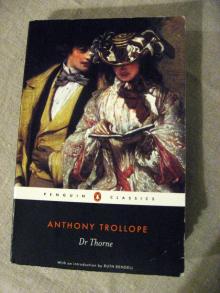 Doctor Thorne
Doctor Thorne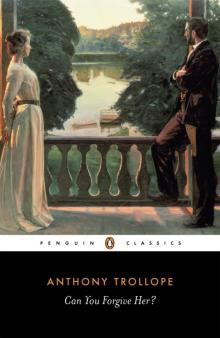 Can You Forgive Her?
Can You Forgive Her?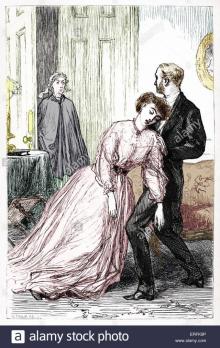 The Last Chronicle of Barset
The Last Chronicle of Barset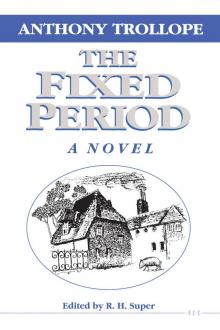 The Fixed Period
The Fixed Period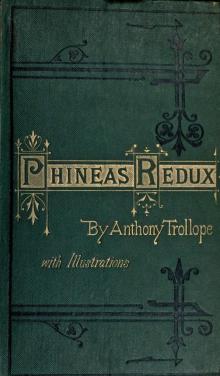 Phineas Redux
Phineas Redux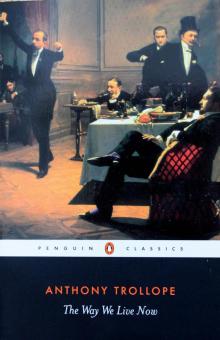 The Way We Live Now
The Way We Live Now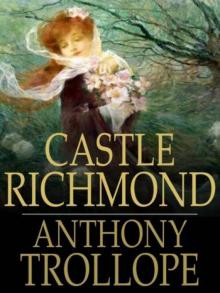 Castle Richmond
Castle Richmond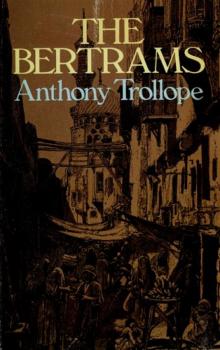 The Bertrams
The Bertrams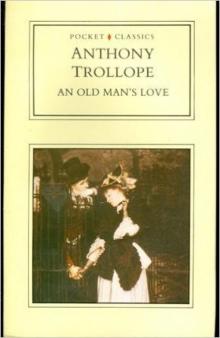 An Old Man's Love
An Old Man's Love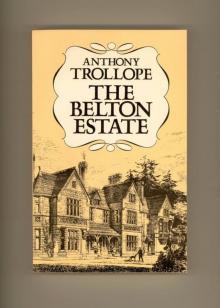 The Belton Estate
The Belton Estate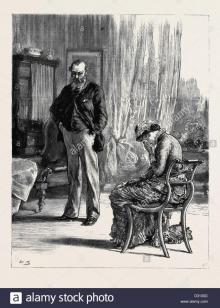 Marion Fay: A Novel
Marion Fay: A Novel The Claverings
The Claverings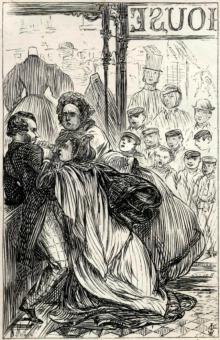 The Struggles of Brown, Jones, and Robinson
The Struggles of Brown, Jones, and Robinson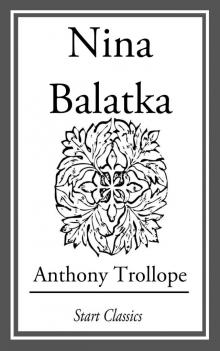 Nina Balatka
Nina Balatka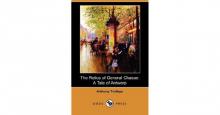 The Relics of General Chasse: A Tale of Antwerp
The Relics of General Chasse: A Tale of Antwerp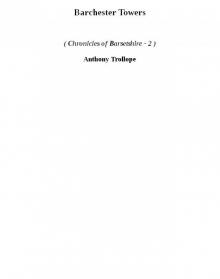 Barchester Towers cob-2
Barchester Towers cob-2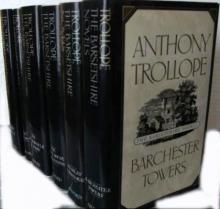 The Chronicles of Barsetshire
The Chronicles of Barsetshire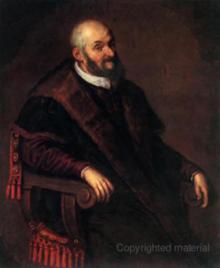 The Warden cob-1
The Warden cob-1 Framley Parsonage
Framley Parsonage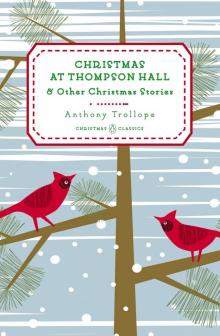 Christmas at Thompson Hall
Christmas at Thompson Hall The Warden
The Warden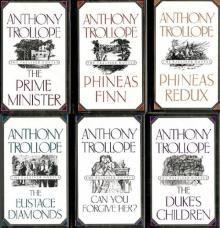 The Palliser Novels
The Palliser Novels The Small House at Allington
The Small House at Allington Barchester Towers
Barchester Towers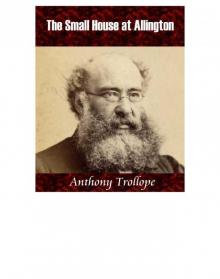 The Small House at Allington cob-5
The Small House at Allington cob-5 The Duke's Children
The Duke's Children Phineas Finn, the Irish Member
Phineas Finn, the Irish Member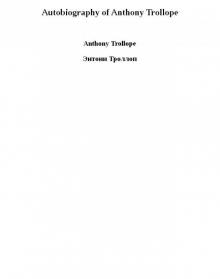 Autobiography of Anthony Trollope
Autobiography of Anthony Trollope